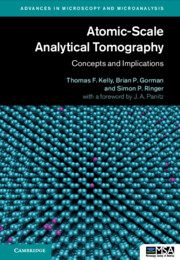Book contents
- Atomic-Scale Analytical Tomography
- Advances in Microscopy and Microanalysis
- Atomic-Scale Analytical Tomography
- Copyright page
- Dedication
- Contents
- Foreword
- Atomic-Scale Analytical Tomography (ASAT)
- Preface
- Acknowledgments
- Introductory Section
- Core Section
- Implications Section
- 10 The Nexus between ASAT and Density Functional Theory
- 11 Implications, Applications, and the Future of ASAT
- Index
- References
10 - The Nexus between ASAT and Density Functional Theory
from Implications Section
Published online by Cambridge University Press: 03 March 2022
- Atomic-Scale Analytical Tomography
- Advances in Microscopy and Microanalysis
- Atomic-Scale Analytical Tomography
- Copyright page
- Dedication
- Contents
- Foreword
- Atomic-Scale Analytical Tomography (ASAT)
- Preface
- Acknowledgments
- Introductory Section
- Core Section
- Implications Section
- 10 The Nexus between ASAT and Density Functional Theory
- 11 Implications, Applications, and the Future of ASAT
- Index
- References
Summary
A burgeoning number of research studies are emerging where scientific questions are being successfully addressed because of the combination of information revealed from atom probe microscopy and density functional theory (DFT). Situations where high-quality experimental data alone would not wholly answer the question at hand and, equally, situations where atomistic simulations would have no obvious starting place were it not for the atom probe. Atomic-scale analytical tomography holds great potential to expand the realm of mediation between experimentation and computer simulation of materials properties. Any model framework is applicable, but we have delved into detail for the case of DFT because it is a self-consistent theory that has arguably the most immediate and exciting intersection with ASAT data.
Keywords
Information
- Type
- Chapter
- Information
- Atomic-Scale Analytical TomographyConcepts and Implications, pp. 201 - 221Publisher: Cambridge University PressPrint publication year: 2022
